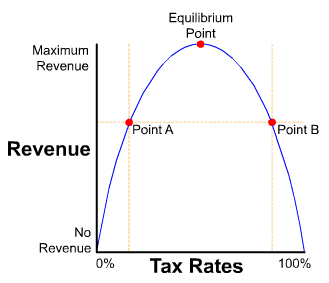To: eraser2005
The question is how flat is the laffer curve and where are we on it?
Agreed-- and we also evidently agree that the model is a valid simplification. It's only when we get off on picking this or that tax-cut/hike that we end up in the kind of quarrel that only makes pundits rich.
If tax cuts really resulted in growth, you should see a higher slope than average shortly after each drop in the tax rates, whereas a tax hike should see the opposite effect. You don't see either effect....
Part of the problem is alternate causes, and part is the fact that people can see whatever they want to see. This is why I like to actually look at the numbers. Here's the plot-- if we still don't have a consensus we can even calculate an index of correlation to prove just how weak or strong it is. Any correlation between tax rates and revenue supports the Laffer model. A positive correlation says were at Point A, and a negative correlation puts us at Point B.
Off hand, I see a weak to moderate statistical inverse correlation between tax rates and gdp growth within two years.
189 posted on
02/03/2006 12:08:34 PM PST by
expat_panama
(There's a million kinds of people-- them that understands numbers, and the rest of us.)
To: expat_panama
Agreed-- and we also evidently agree that the model is a valid simplification. It's only when we get off on picking this or that tax-cut/hike that we end up in the kind of quarrel that only makes pundits rich. VERY good points. :) I would be interested in seeing the correlation data. I see several short term spots where there is a positive as well as a negative correlation, so in all I would say it looks weak. But then another problem is when you look at years like the early 80s. The top tax rate then dropped, but the real beauty was in the simplification of the tax code, which can skew the results (ie, does the drop in tax rates equate a drop in taxes, or do the elimination of deductions mean people pay what looks like a lower marginal rate, but is actually about the same effective tax rate). The one thing I do see a stronger correlation in is the volatility of GDP growth and tax rates. Once top rates get below 50%, volatility seems much less pronounced.
FreeRepublic.com is powered by software copyright 2000-2008 John Robinson
